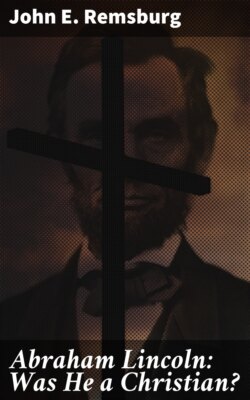Читать книгу Abraham Lincoln: Was He a Christian? - John E. Remsburg - Страница 7
На сайте Литреса книга снята с продажи.
INTRODUCTION.
ОглавлениеTable of Contents
Was Abraham Lincoln a Christian? Many confidently believe and earnestly contend that he was; others as confidently believe and as earnestly contend that he was not.
Before attempting to answer this question, let us define what constitutes a Christian. A Christian is one who, in common with the adherents of nearly all the religions of mankind, believes, 1. In the existence of a God; 2. In the immortality of the soul. As distinguished from the adherents of other religions, he believes, 1. That the Bible is a revelation from God to man; 2. That Jesus Christ was the miraculously begotten son of God. He also believes in various other doctrines peculiar to Christianity, the chief of which are, 1. The fall of man; 2. The atonement.
Those who in nominally Christian countries reject the dogmas of Christianity are denominated Infidels, Freethinkers, Liberals, Rationalists, unbelievers, disbelievers, skeptics, etc. These Infidels, or Freethinkers, represent various phases of belief, among which are, 1. Deists, who affirm the existence of a God and the immortality of the soul; 2. Atheists, who deny the existence of a God, and, generally, the soul's immortality; 3. Agnostics, who neither affirm nor deny these doctrines.
The following are the religious views Lincoln is said to have held as presented by those who affirm that he was a Christian:
1. He believed in the existence of a God, and accepted the Christian conception of this Being.
2. He believed in the immortality of the soul, and in the Christian doctrine of the resurrection.
3. He believed that the Bible is a revelation from God—the only revealed will of God.
4. He believed in the divinity of Christ—believed that Christ is God.
5. He believed in the efficacy of prayer, and was accustomed to pray himself.
6. He believed in the doctrine of experimental religion, and had experienced a change of heart.
7. Although he never united with any church, he was contemplating such a step at the time of his assassination.
8. The church with which he would have united, we are led to infer, was the Presbyterian.
The following is a statement of the theological opinions of Lincoln as understood by those who deny that he was a Christian:
1. In regard to a Supreme Being he entertained at times Agnostic and even Atheistic opinions. During the later years of his life, however, he professed a sort of Deistic belief, but he did not accept the Christian or anthropomorphic conception of a Deity.
2. So far as the doctrine of immortality is concerned, he was an Agnostic.
3. He did not believe in the Christian doctrine of the inspiration of the Scriptures. He believed that Burns and Paine were as much inspired as David and Paul.
4. He did not believe in the doctrine of Christ's divinity. He affirmed that Jesus was either the son of Joseph and Mary, or the illegitimate son of Mary.
5. He did not believe in the doctrine of a special creation.
6. He believed in the theory of Evolution, so far as this theory had been developed in his time.
7. He did not believe in miracles and special providences. He believed that all things are governed by immutable laws, and that miracles and special providences, in the evangelical sense of these terms, are impossible.
8. He rejected the doctrine of total, or inherent depravity.
9. He repudiated the doctrine of vicarious atonement.
10. He condemned the doctrine of forgiveness for sin.
11. He opposed the doctrine of future rewards and punishments.
12. He denied the doctrine of the freedom of the will.
13. He did not believe in the efficacy of prayer as understood by orthodox Christians.
14 He indorsed, for the most part, the criticisms of Thomas Paine on the Bible and Christianity, and accepted, to a great extent, the theological and humanitarian views of Theodore Parker.
15. He wrote a book (which was suppressed) against the Bible and Christianity.
16. His connection with public affairs prevented him from giving prominence to his religious opinions during the later years of his life, but his earlier views concerning the unsoundness of the Christian system of religion never underwent any material change, and he died, as he had lived, an unbeliever.
